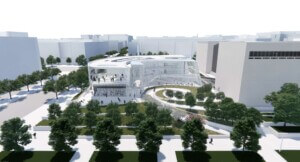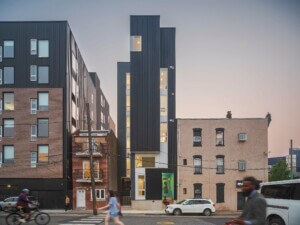Closing out what’s been an, umm, eventful week, here are just a few notable news items to peruse before another summer weekend begins. Stay safe and hydrated, and we’ll see you on Monday.
Seoul moves to ban subterranean dwellings following deadly flooding
Officials in Seoul are mulling a ban on basement-level and semi-basement-level homes following a historic rainstorm that unleashed catastrophic flooding across large swaths of the South Korean capital city. Known as banjiha flats, Seoul’s subterranean abodes represents roughly 5 percent of the city’s total housing stock. Emblematic of rampant economic inequality, Banjiha homes gained international attention thanks in part to Parasite, Bong Joon-ho’s genre-spanning, Oscar-winning 2019 film centered around a struggling family residing in such a dwelling. At least four people residing in banjiha homes drowned during the recent flooding.
As reported by the South China Morning Post, officials are considering a total ban on the construction of banjiha flats and landlords will be allowed 10 to 20 years to remove underground apartments from existing buildings to prevent further tragedy during major rain events.
H/t to South China Morning Post
A maximalist “playground” set to debut at Mies’s Midtown masterpiece
On the topic of underground spaces, the New York Times recently stopped by the newest Midtown Manhattan “Playground” to observe a quick game of pick-up. Officially opening August 15, the amenity-stuffed recreational facility and conference center is fashioned out of a portion of a subterranean parking garage and part of the floor above it at the Seagram Building, Mies van der Rohe’s game-changing 1958 office tower at 375 Park Avenue. The $25 million space, which features a climbing wall and a basketball court that can be adapted for pickleball and volleyball matches, was created by building owner RFR to lure employees back to the office. Sheldon Werdiger, head of marketing and design development, heralded the space as the “Madison Square Garden of amenity spaces.”
H/t to the New York Times
The Architect of the Capitol is relocating a hidden treasure at Rock Creek Park in Washington, D.C.
An enigmatic heap of sandstone and marble removed from the original East Front of the U.S. Capitol Building during midcentury renovations and later deposited at Rock Creek Park in Northwest Washington, D.C., will be relocated. As reported by Bloomberg Government, the so-called Capitol Stones, which have served as an “unsanctioned tourist attraction” at the sprawling, National Park Service–managed Rock Creek Park for years, will be moved to a storage facility at Fort Meade per orders from the Architect of the Capitol (AOC). The relocation scheme will reportedly be carried out over the span of several years.
“The stones are being moved at the request of the National Park Service for safety, realignment and preservation purposes,” Kiren Marshall, senior communications specialist for the AOC told Bloomberg. “They are being moved to the AOC’s area at Ft. Meade. The public will not have access to the stones there.”
The stones were previously at the Capitol Power Plant before being stored deep in the woods of Rock Creek Park in the early 1980s. Marshall told Bloomberg that there’s the chance that the stones could be incorporated into future renovation projects at the Capitol although nothing concrete is in the works.
Some D.C. residents are bummed by the news, including David Plotz, journalist and former CEO of Atlas Obscura, who called the AOC’s decision ““joyless and pointless and incredibly stupid.”
“The special part is that they’re hidden in Rock Creek Park and the experience of discovery,” Plotz said. “It’s what’s great about exploring a city. And it’s like visiting a Mayan temple or a religious site in that it’s about the experience of it.”
H/t to Bloomberg Government
A historic court building will be redeveloped to house the African American Museum in Philadelphia
Also on the move is the African American Museum in Philadelphia (AAMP), which will relocate from its current home on Arch Street to the Family Court Building on Ben Franklin Parkway. As detailed by the Philadelphia Inquirer, the AAMP will only populate a section (a planned 50,000 square feet) of the historic Beaux-Arts structure, which was completed in the early 1940s and spans nearly 250,000 square feet. A timeline for the move is unclear; four shortlisted developers are now vying for the high-profile project with their proposals due by the end of this year.
The move would enable the AAMP to increase its size threefold and offer visitors a range of new features. Established in 1976, the museum is described as the “first institution built by a major United States city to house and interpret the life and work of African Americans.”
“We’re excited that it will be where it belongs on the Parkway, where literally tens, hundreds of thousands of people traverse on a[n] … annual basis, every year,” City Council President Darrell L. Clark said in a statement. “Everybody knows where the park is, so it’s befitting that the African American Museum is here.”
H/t to the Philadelphia Inquirer
New renderings and details unveiled for L.A’s emissions-curbing Dodger Stadium Gondola
Los Angeles Aerial Rapid Transit (LA ART) shared new renderings of a proposed $125 million gondola system that would ferry passengers from Union Station to Dodger Stadium and back with a stop near the Chinatown Station transit hub at Spring and College Streets.
Per Urbanize LA, this week’s rendering reveal was also accompanied by news that LA Art has partnered with Zero Emissions Transit, a subsidiary of the nonprofit Climate Resolve, to help get the controversial and years-in-the-making scheme off the ground. Climate Resolve anticipates that the gondola system could eliminate up to 3,000 game day vehicle trips and ticket-holders would be able to ride the system for free; for non-ticket-holders, a dizzying lift to Dodger Stadium would be tied to the fare of a ride on the Metro.
A draft environmental impact review is set to be completed this fall.
H/t to Urbanize LA











